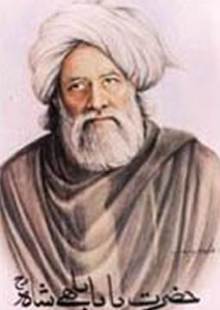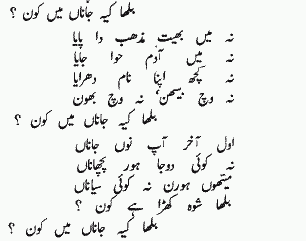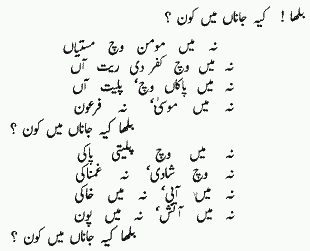Adil Najam
 A whole new generation has rediscovered Bulleh Shah. That is good.
A whole new generation has rediscovered Bulleh Shah. That is good.
Much of the credit for this rediscovery goes to the ‘sufi rock’ band Junoon and, more recently to the New Delhi singer Rabbi Shergill, and most importantly to the magnetic simplicity of ‘Bulla, ki jaanan mein koun.’ (I guess, Abida Parveen did for our generation what these guys are doing in interpreting Bulleh Shah for a new generation).
I must confess that I am a traditionalist and prefer more classical renditions of this timeless piece. My own sense, much like Deevan’s (of the blog ‘Rambling On’), is that Rabbi Shergill does a far superior job than Ali Azmat did. At least for me, Rabbi seems to ‘gets it’ more than Junoon did. But, in honesty, I am grateful to both; I also think that both should be grateful to Bulleh Shah.
So, why not judge for yourself. Here is the rendition by Rabbi Shergill. If you are new to Bulleh Shah, listen to it a couple of times before giving up on it. You can view it here by clicking on the play (arrow) button on the image below, or go to video.google.
For those who may want it, here is a version of the original and a translation by Kartar Singh Duggal:


I know not who I am
I am neither a believer going to the mosque
Nor given to non-believing ways
Neither clean, nor unclean
Neither Moses not Pharoah
I know not who I am
I am neither among sinners nor among saints
Neither happy, nor unhappy
I belong neither to water not to earth
I am neither fire, not air
I know not who I am
Neither do I know the secret of religion
Nor am I born of Adam and Eve
I have given myself no name
I belong neither to those who squat and pray
Nor to those who have gone astray
I know not who I am
I was in the beginning, I’d be there in the end
I know not any one other than the One
Who could be wiser than Bulleh Shah
Whose Master is ever there to tend?
I know not who I am.
‘Ki jaanan mein koun’ is the best known and most elegant of Bulleh Shah’s work and is itself an adaptation/translation from the works of earlier Persian philosophers. I wish that more people and singers will start looking at the rest of Bulleh Shah’s repertoire. Some have. For example, Shoaib Mansoor has already done a wonderful rendition of ‘Teray ishq nachaya kar thai-ya thai-ya’ as part of the Supreme Ishq series. And Noori has a song that seems inspired by ‘Kuttey tain-to uttay’.
If others also paid Bulleh Shah more attention, they might find that in terms of his themes Bulleh Shah may be the most contemporary poet in South Asia today. Try looking at ‘Bass kar ji’ (Enough is enough) or ‘Moun aayee baat na rehndi hai’ (I must utter what comes to my lips) and you will find them resonating with your most contemporary political and social preoccupations.
Followup post on Bulleh, Jugni, Shergill & Junoon, here.



















































I am sad that I discovered Bulleh Shah so late in life. There was relaly no serious mention of him or other sufi poets in our schools or even college. We really should be teaching them early to children, certianly in college.
lovely song.
a all time favorite.
dear msk,
in any relationship where there is a disagreement weather that relationship be man and wife or just two people exchanging views over the net, there are three magic words that when said put everything into perspective and usually bring the argument to a satisfactory conclusion for all concerned, and i’d like to say them now to you and all the other punk rock fans. your so right!!
I only discovered Bulleh Shah a few years ago when coming acrossing a qawalli tape that I discovered in my father’s taxi. This qawalli was sung by Nusrat Fateh Ali Khan. Although I did not understand most of the qawalli – as it was in hardcore Punjabi – my grandfather explained the whole qawalli, along with its’ relationship with Bulleh Shah.
The qawalli can be accessed at:
http://www.musicindiaonline.com/p/x/CUb.JmyVpd.As1 NMvHdW/
Maybe we disagree not only on the meaning of Sufi poetry but also on the essence of punk music. Both are anti-establishment, both are spiritual but defy the custodians of formal religion, and both are retaliations to injustice. I find the attempt to bring the Sufi poets into the ‘mainstream’ interesting; especially becasue mainstream religion had shunned and made fun of these Sufi poets (now called saints)when they were alive. The point of ‘masjid dhaa dey’ is exactly that God does not need these buildings, or the custodians of these buildings (the mullahs), becasue God is in everyone’s heart. So much of Sufi poetry is a retaliation to established religion becasue, like punk, it sees a good thing (faith) being abused by the mainstream. As to music being haram. No it is not. And if it is, then that mus mean that all of sufi poetry is haram too!